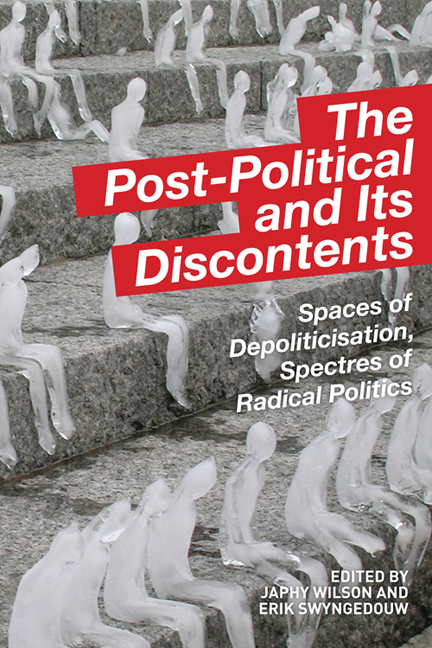There Is No Alternative
Published online by Cambridge University Press: 05 August 2016
Summary
The realization of the world as global market, the undivided reign of great financial conglomerates, etc., all this is an indisputable reality and one that conforms, essentially, to Marx's analysis. The question is, ‘where does politics fit in with all this? What kind of politics is really heterogeneous to what capital demands?’ – that is today's question. (Alain Badiou, in Žižek 2000: 90)
Slavoj Žižek raised this question at the turn of the millennium, in the midst of a fierce debate with Ernesto Laclau over the nature and possibility of radical politics in the post-political age. Their confrontation embodied the political tensions that persist within the literature on post-politics, and which permeate this book. For his part, Laclau (2000a, 2000b) continues to espouse the radical democracy project that he set out with Chantal Mouffe in Hegemony and Socialist Strategy (1985). This project was explicitly post-Marxist and anticommunist, and was devoted to creating a political space for new social movements and new political identities not reducible to the industrial proletariat and its limited struggles. In his early work, Žižek was also committed to radical democracy, and he actively participated in the pro-democracy movements that contributed to the fall of communism in Eastern Europe. Yet these movements quickly disappeared after legitimating the transition from bureaucratic socialism to ‘free market’ capitalism via the brutal methods of economic shock therapy. The outcome was a new hegemony of transnational capital in alliance with IMF technocrats and members of the old nomenklatura, in which increasing poverty, inequality and unemployment were legitimated by appeal to economic necessity, combined with the mobilisation of right-wing nationalism, antiimmigrant xenophobia, and the rapid degeneration of democracy into a set of post-democratic rituals. This profoundly disillusioning sequence was reproduced in different forms in other parts of the world, and forced many of the so-called ‘new Left’ to reconsider their commitment to radical democracy. The abandonment of the critique of capitalism and its replacement with a pluralistic play of differences no longer seemed subversive or liberating, but now appeared as a crucial component in the ideological machinery of the post-political order. This crisis opened a new political space on the Left, occupied by Žižek, Badiou, Jodi Dean and others, who held themselves apart from both orthodox Marxism and radical democracy, and sought to reformulate an explicitly anti-capitalist project on the absent ground of post-foundational theory.
- Type
- Chapter
- Information
- The Post-Political and Its DiscontentsSpaces of Depoliticisation, Spectres of Radical Politics, pp. 299 - 312Publisher: Edinburgh University PressPrint publication year: 2014



